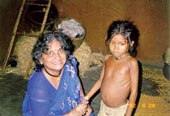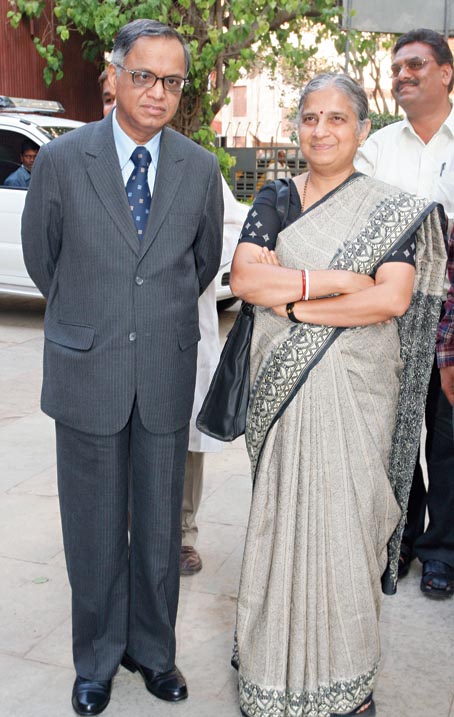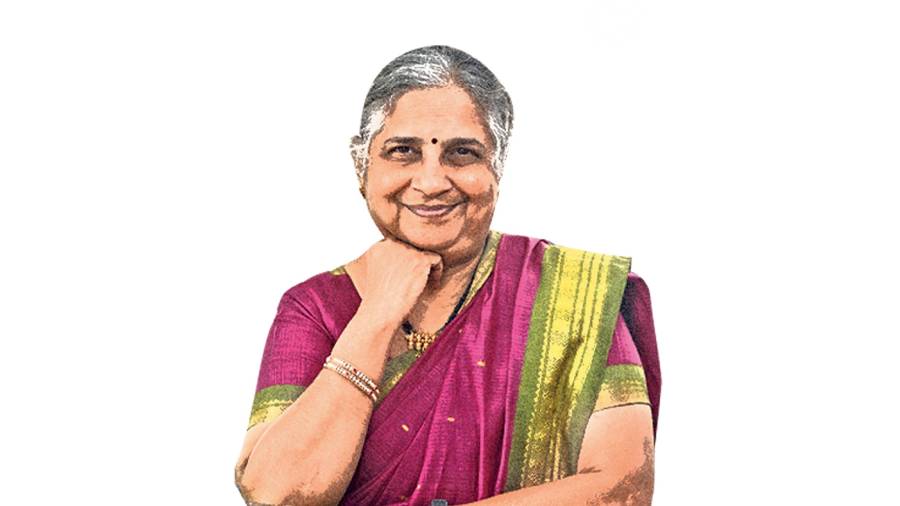Whenever we are stuck in traffic in Bangalore and my husband complains, I remind him that he is responsible for it!” Sudha Murty quips sometime in the middle of a session for the Ladies Study Group (LSG) and a subsequent chat on January 13. Chairperson of Infosys Foundation for the last 25 years, Murty is a woman of many firsts. Incidentally, her meagre savings of Rs 10,000 that acted as seed money for husband Narayana Murthy to start Infosys Limited as she put her own career on hold also helped put India on the IT map of the world.
A Padma Shri-recipient, she has aided relief work for 16 national disasters since setting up the foundation in 1996, has written over 30 books in English and Kannada that have been translated into more languages across India, and has set up over 60,000 libraries in the country, and this is just touching the tip of the formidable iceberg that is Murty’s repertoire. “While we have all watched movies, read books and comic strips on fictional female superheroes achieving the impossible, being in conversation with Sudha Murty has been a testimony to the fact that such women do exist and are there for us to emulate. This has truly been a landmark session for all and an absolute honour and privilege for me personally,” said Diya Jaiswal, president, LSG, who also moderated the session.
Her books for children are often referred to as the “Panchatantra of modern times” but it is an anthology of shorts she wrote (Three Thousand Stitches — Ordinary People, Extraordinary Lives) that perhaps best summarises her own journey in social work, from getting hit by chappals to being nestled within the folds of trust by the devadasis, which has remained a personal favourite of mine.
Warm and generous with her laughter, Murty in the middle of her chat with me takes time to ask if I have read the aforementioned book. Easy to giving, it is not difficult to understand why it is second nature to her to live the way she does. Here are some of the highlights of her story in her own words.

The journey of giving
I can’t recollect the first time I gave something to someone but I can easily tell you that I was fortunate to be born in a family where my grandparents and parents were always giving. My father was a doctor who would not want to be unavailable over the phone even when he was eating as it could be a suffering patient at the other end trying to get in touch. I was born in a middle-class family for whom money wasn’t important but concern for people was. My grandfather taught me to give the best to people. Atithi was the most important and spending on ourselves was the least important. Those were the things that were taught to me as a child and that has been a big influence in my life.
Inception of Infosys Foundation
When I had given a gold ring as a 12-year-old to people collecting money for our soldiers fighting the China war in 1962, I had expected my mother to be very angry. But she said that I had done a good job because she was aware of the cost that the independence of our country came at.
That encouraged me to do more in life and I have written about that in Amma, What’s Your Duty?, when my daughter asked me what my aim in life was when I was 45. That’s when I realised I wanted to do something for the society in a more formal way and formed the foundation. That started in 1996 and we are running into its 25th year now.
Leading by example
I used to take my children to work and make them help me pack along with volunteers when we would help out during national disasters. When Rohan (her son, Rohan Murty) was very young, he came and told me how his friend in school treated him to a meal at a five-star for his birthday. But I never did that for my children when they were young. He wanted to celebrate his birthday the same way but I did not agree. My sister was a doctor at a government hospital and I took him there on his birthday instead. He was very upset but I asked him to give it a chance. Seeing so many suffering children there, he asked me why that was their predicament. I told him that the only difference between those children and him was that they were born on the other side and could not afford the basics. I asked him if we could save the money spent for his birthday to buy things for the children in the paediatric ward instead. For his birthday, I told him we would have samosas and Frooti to celebrate at home. I have always believed that money does not make us great but it is how useful we are to society.
In 2001, on his 18th birthday while he was at Cornell University when I wished him, he wrote an email to me saying he was proud of me as unlike every mother who works for their child, ‘you work for others’ children and your children too’. I felt that was a gift to me on his birthday.
Pilgrimage to Benares (Varanasi)
In south India, going to Benares for pilgrimage was a dream. I went in 1995 and the rule is that when you go there, you must leave something there that is very dear to you. My husband would make fun saying that he would not go because then he would have to leave his dearest thing there, which was me. (Laughs) I used to love going to shop for saris for anyone as I saw a reflection of nature in the colours. So after taking a dip in the Ganges, I decided to abandon shopping for saris. I realised how impulsive it was a little later and sat on the steps there thinking about it. But I made up my mind as I asked myself why I was wearing new saris. Since then, I genuinely lost my zest for sari shopping. I go with people who insist but I really don’t like it anymore, and did not indulge in it even for my daughter and son’s weddings. Sometimes it is difficult to say no to people gifting me saris with love but I try to not take saris from anyone, including my relatives.
“The girl with the bob cut”
I come from a small community that was very conservative. Nobody in our history has married anybody across the river Tungabhadra — men were very intelligent and women used to be great cooks in our family. I was the first to marry across the river and everyone was shocked. Scissors would not touch a woman’s hair in the family — only the man’s, except when you went to Allahabad for pilgrimage. And I had a bob cut because it was easier to maintain. My relatives were so upset and my house became the house of “the girl with the bob cut”!
From there I went to engineering college, where I was the only girl in the entire batch. I was alone and it wasn’t easy, but I always believed that it’s all in the mind and that’s how I got through.
“Women students need not apply”
I never wanted to work in India and had gotten a scholarship to a university in the US for my doctorate. But then I saw a notice in college about “young, bright engineers” being required at Telco (erstwhile Tata Engineering and Locomotive Company, now Tata Motors) Pune and Jamshedpur with a stipend of Rs 1,500, which was pretty good in 1974. There was a line at the bottom of the notice saying: “Women students need not apply”. I felt offended and wrote a postcard to J.R.D. Tata asking how someone like him and his company could not harness the capacity of womenfolk in India. And then came a letter for an interview for me, which I cleared and got an offer.
I had decided not to join but then my father questioned my sitting for the interview in the first place if I did not want the job. “If you’re on the topic of equal rights for women then you’re opening a cupboard with many skeletons in it. You must take up this job to open the road for other women instead of being selfish and settling abroad,” my father told me. I took up the Telco job and the rest is history.

Sudha Murty, with husband Narayana Murthy
Narayana Murthy’s marriage proposal on a rickshaw
Murthy told me, “Look I am 5’4”, not good to look at, I come from a poor family. I cannot make you rich but I will give you happiness, contentment and we will read a lot of books together.” I told him, “I am not a great cook and I always like adventure.” So we told each other what we could and could not do and then decided to not spend any money on our wedding. We got married at home with Rs 800 paid equally by the two of us.
The Infosys dream
Whenever we are stuck in traffic in Bangalore and my husband complains, I remind him that he is responsible for it! He started the software industry here and got more people, more cars and now the city is a concrete jungle. We did start Infosys but Murthy was a bigger dreamer than me. He always wanted software to be birthed in India because he believed that ethical hard work was enough to become rich in India without any malpractice. He believed that the creation of wealth lay in the creation of jobs. I gave my savings of Rs 10,000 to my husband for it. I always say that the secret to my happy marriage is that behind every successful woman is an understanding man. Murthy returned my support when I started the Infosys Foundation.
Love for storytelling
I used to write since I was in school and I started writing more because of Infosys Foundation. My position helped me look at the lives of a variety of people from actors and politicians to the poor from close quarters and got so many stories to tell. It is difficult to pick a favourite book but as I write more, the writing gets better. Amongst the books written about animals, The Gopi Diaries (named after her pet dog, Gopi) series is one of the most satisfying in my life.
Getting hit by chappals and rotten tomatoes
When I started the Infosys Foundation, I did not know which problem I should have addressed first because in India, there are so many! I started with the devadasi project without knowing its depth and it was very hard. Initially, they did not accept me and threw chappals and rotten tomatoes at me. It took 18 years for them to accept me and then, with Abhay Kumar, we did a lot of good work.
My father used to tell me that he would feel very proud of me if I could change the lives of 10 devadasis but I had only managed to change the lives of seven when he died. Since then, it is more than 3,000 now. When these 3,000 women left their old lives, got successfully rehabilitated and then started their own bank, they called me to thank me. I created the Mahila Vimochana Sangh for them so that they could ask for their own rights, pensions, housing, etc. As a gift, they made a quilt with 3,000 stitches, each put in by one of them to remember me. I went to Bangladesh and got them a better quality of quilt with great kantha work on it and told them to try to make it this way, which they did and I sold those on their behalf.
A promise translated into over 60,000 libraries
The first building I remember seeing in my village with my grandfather was a library and I read all the books. He made me promise him that if I had money in my life, I would supply books to at least one library in my lifetime. My grandfather read the philosophy of philanthropists like (Andrew) Carnegie and (Andrew) Mellon and passed them on to me, which left a deep impact and influenced who I am today.
Pictures: Infosys Foundation and Agencies
Rapid fire
Money is: A great facilitator for work
Fame is: A concept about me but has nothing to do with me
Happiness is: Mental contentment
The secret of a good marriage is: Giving space to each other
Your strength is: To adjust
Your weakness is: Food
The one quality you would change in your husband, Narayana Murthy (right): He could be a little more talkative and expressive.
One thing you disagree with your husband on: For him, technology is the most important and, for me, humanity is the most important.
